STAMINA
BY KATE RHÉAUME, ND
Healthy Homes, Healthy Brains
BY STEPHANIE RUBINO, ND

BY JULIA SOLNIER, P h D
BY MARITA SCHAUCH, ND
BY KARLENE KARST, BS c NUTRITION
BY NADIA BADOWSKI

BY KATE RHÉAUME, ND
BY STEPHANIE RUBINO, ND

BY JULIA SOLNIER, P h D
BY MARITA SCHAUCH, ND
BY KARLENE KARST, BS c NUTRITION
BY NADIA BADOWSKI
CogniSave™ was formulated to help protect brain cognition.
• Omega-3 – high-potency EPA, DHA, and DPA
• B Complex – full-spectrum active B complex
• Phosphatidylserine – protects brain cell membranes
• Phosphatidylcholine – boosts cognitive function

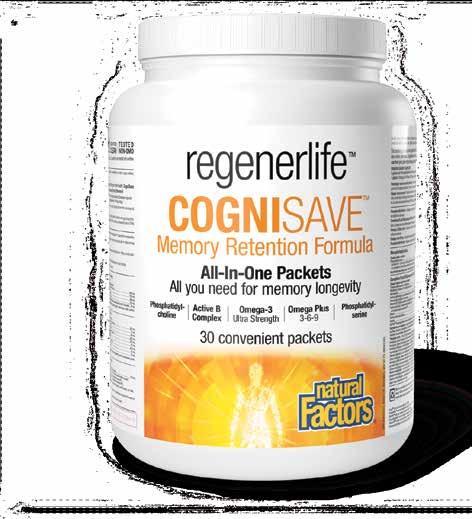






At Women’s Voice®, we are committed to providing our readers with real health solutions from real physicians. To ensure our editorial excellence, we have assembled medical professionals who are dedicated experts and leaders in natural health to serve on Women’s Voice Medical & Science Editorial Advisory Committee.

KATE RHÉAUME, ND
Dr. Kate Rhéaume is a graduate and former faculty member of the Canadian College of Naturopathic Medicine. A leading expert in natural medicine, Dr. Kate is the author of the best-selling book Vitamin K2 and the Calcium Paradox (HarperCollins).




KAREN JENSEN, ND
Dr. Karen Jensen was in clinical practice for 25 years and although she is retired, she continues to write books and educate on the naturopathic approach to wellness. She is the author or co-author of seven books; her most recent is Women’s Health Matters: The Influence of Gender on Disease.
KARLENE KARST, BSc Nutrition
Karlene Karst holds a BSc in Nutrition and is the founder of the Sea-licious® line of products. She is a mom of three active kids, an avid food and recipe creator, and an author. In her latest cookbook, This Kitchen Is for Dancing, Karlene shares 100 delectable, health-conscious recipes. Follow Karlene on Instagram @karlenekarst
JULIE REIL, MD
Dr. Julie Reil is an internationally recognized physician, health and nutrition advocate, speaker, and Women’s Voice author. She developed the Genityte® urinary incontinence procedure and the Triple Tone Treatment®. Dr. Reil founded Shiloh Medical Clinic in Billings, Montana.
MARITA SCHAUCH, ND
Dr. Marita Schauch is the author of two books, Making Sense of Women’s Health and Collagen Myths & Misconceptions. She also co-authored The Adrenal Stress Connection. In addition to her clinical practice, she lectures across North America, educating people on positive lifestyle choices.
Editor: Nancy Frances Cheeseman
Deputy Editor: Brinda Navjee
Editorial Assistant: Heba Sourour
Art Direction: Stephen Rank, Beata Stolarska
Graphic Designers: Rut Shapira, Jasper van Meurs, Celia Bowes, Mark Cawker, and Felicia Yee
PUBLISHED BY
Women’s Voice Magazine
104–3686 Bonneville Place Burnaby, BC V3N 4T6



STEPHANIE RUBINO, ND
Dr. Stephanie Rubino is a licensed naturopathic doctor in clinical practice focusing on preventive health. As a wellness educator, she highlights the importance of nutrition, lifestyle, and the safe use of supplements. She has been a contributor to various health publications and has appeared on TV news shows.
JENNIFER BRIX, ND
Jennifer Brix is a licensed naturopathic doctor, health educator, and public speaker with a passion for empowering her patients to achieve optimal health. She has particular expertise in treating digestive complaints, hormone imbalances, and brain-related health conditions.
GAETANO MORELLO, ND
Dr. Gaetano Morello is a published author and licensed naturopathic physician. Recently he has been appointed as a Clinician at the newly created Complex Chronic Disease Program located at BC Women’s Hospital in Vancouver. He is the first naturopathic doctor to hold such a position at a major North American hospital.


JULIA SOLNIER, PhD
Dr. Julia Solnier has a doctorate in Pharmaceutical Sciences from the University of Graz, Austria. She is an expert in pharmacognosy (medicinal plant research) with lecturing experience on herbal medicine. Julia is a Research Scientist at Factors Group and ISURA®. She focuses on conducting clinical trials and developing innovative delivery solutions.
MICHAEL R. LYON, MD
Dr. Michael Lyon is a UBC faculty member and is a published researcher in the fields of nutrition, appetite regulation, dietary fibre, and blood sugar regulation. He is Board Certified in Obesity Medicine through the American Board of Obesity Medicine and he completed a three-year family practice residency in 1988.
In this magazine, we will advertise only products exclusively sold in natural health stores.
The information in this magazine is for educational purposes only. It should not be used as a substitute for the advice of a qualified and licensed health professional. All rights reserved. No part of this publication may be reproduced, copied, sold, or distributed without prior authorization. All article references can be found at womensvoicemagazine.com
Women’s Voice® is a registered magazine in Canada and the United States. Canada: 1811559 / USA: 87249676
Real Physicians – Real Solutions
Cover photo: Robin W.
“Alone, we can do so little; together, we can do so much.”
– Helen Keller

Helen Keller’s insights on community resonate deeply with us. WV magazine relies on a collaborative effort from dedicated health professionals and natural health retail stores to deliver impactful content to our readers. In this volume, Michael T. Murray, ND, and Joseph E. Pizzorno, ND, provide a scientific guest editorial debunking fake news about dietary supplements having no health value. These two esteemed educators possess over 100 years of experience in medical research and patient care. They have seen the significant benefits of using supplements and embracing a healthy lifestyle.
The mental health challenges faced by children and teens worldwide are currently at an all-time high. Join us for an insightful Q&A with Karen Jensen, ND, about her new book, Mental Health Crisis in Children and Teens, which explores the positive role of nutrition on mental health. The book will be available in natural health stores and online in the fall of 2024.
WV is pleased to introduce the remarkable Nadia Badowski, the innovative founder of the prestigious award-winning beauty and personal care brand Koope. Koope is an allergen-free skincare line that is hyper-focused on using the finest clean ingredients and giving back to communities. Koope prioritizes people over profit and believes in positively impacting the world.
Additional articles include “Women at Higher Risk of Neurodegenerative Diseases.” Learn why “Self-Care Is a Superpower” and take Dr. Marita’s “Healthy Living Quiz.” Plus, gain insight into how “Supplements Revitalize Stamina.”
Thank you to the WV team for providing exceptional health, wellness, and sustainability content. Fuel Your Health, Transform Your Life – Nancy Frances Cheeseman
“We’re creating a global community of people of all ages, shapes, and backgrounds who care deeply about each other, natural health, and our planet’s ecosystem. Our team includes doctors, nutritionists, and health advocates working for a healthier planet.”
Contact Us – Write to us. Your feedback helps us improve WV magazine. Email the editor at info@womensvoice.com
We are dedicated to supporting natural health retailers throughout North America. WV magazine is only available in natural health stores and online. For over 80 years, our retail partners have sold dietary supplements to improve health, emphasized the advantages of organic products and a healthy lifestyle, and strengthened local economies. These stores play a crucial role in fostering community and reducing the planet’s carbon footprint.
At WV magazine, our commitment to Planet Earth is strong and getting stronger! The print you are reading today uses recycled inks and FSC® certified paper, made from a combination of material from well-managed FSC-certified forests and recycled material. The Forest Stewardship Council® (FSC®) ensures that FSC Mix paper maintains forest health and protects fish and wildlife habitats.

BY JULIA SOLNIER, PhD

For many of us, the fear of losing our cognitive faculties – the very essence of our identities – to diseases like dementia or Alzheimer’s is a deeply troubling prospect that can overshadow many other health concerns. Unlike cancer or cardiovascular disorders, there is currently no cure for these conditions, making prevention or risk reduction our primary strategy.
Alzheimer’s is nearly twice as prevalent in women as it is in men. Women’s longer lifespan, often exceeding eightyfive years, contributes to a higher incidence of Alzheimer’s, reaching rates of up to 40%. However, even after
adjusting for age, women remain more susceptible to Alzheimer’s, experiencing faster disease progression regardless of educational level.
Menopause marks a significant hormonal shift for women, which, combined with reproductive history factors like number of children, age of first menstruation, and/or oral contraceptive use, is believed to contribute to an increased risk of Alzheimer’s in women.
While dementia and Parkinson’s are more common in men, with rates double those in women, Parkinson’s seems to progress more rapidly in women, a phenomenon still under investigation by researchers.
European studies first spotlighted the pivotal role of nutrition and healthy
lifestyle interventions in Alzheimer’s disease prevention. A landmark, twoyear, randomized, controlled trial conducted in Finland in 2015 found that nutrition, physical activity, and cognitive training can help preserve cognitive function and mitigate cognitive decline in at-risk older adults.
Research shows that cultivating complex skills throughout a lifetime, such as speaking a foreign language or mastering a musical instrument, can build cognitive reserve, offering protection against cognitive decline. Similarly, regular physical activity, particularly in more complex movements like boxing or dancing, may slow the progression of Parkinson’s disease, a concept known as movement reserve.
Individuals with type 2 diabetes face an increased risk of developing Alzheimer’s because of chronic high blood sugar levels, which can damage blood vessels and promote inflammation associated with neurodegenerative diseases. Individuals with Alzheimer’s disease
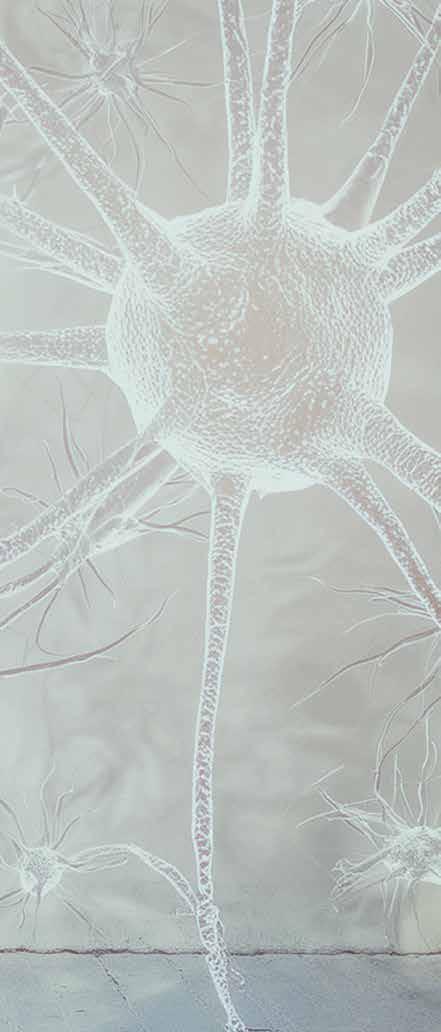
or dementia often have high levels of inflammation marked by high levels of TNF-alpha, cytokines, and IL-6.
THE PREVENTIVE PLAN
Besides having a higher genetic risk of getting a neurodegenerative disease like Alzheimer’s (e.g., apolipoprotein E gene), we can do so much to improve our odds.
FOOD IS MEDICINE. Addressing metabolic issues is the first step to better brain health. High-fibre diets, abundant in fruits and vegetables with antioxidants and anti-inflammatory phytochemicals, can help regulate blood sugar, reduce inflammation, and support gut bacteria to produce shortchain fatty acids essential for brain function.
What’s good for the heart is good for the brain. The Mediterranean diet and MIND diet, rich in monounsaturated fats, omega-3s, and plant polyphenols like berries, as well as low in refined carbs, may reduce the risk of Alzheimer’s disease and slow cognitive decline in older adults. A new study reported that daily olive oil consumption is associated with a lower risk of dying from dementia.
Multiple clinical trials found that the ketogenic diet, with its high-fat and low-carb content, enhances cognition and memory in early-stage Alzheimer’s patients. In contrast, highly processed


foods like cereals and frozen meals are linked to anxiety, depression, and cognitive decline.
EXERCISE. Regular physical activity regulates blood glucose, improves blood flow, and keeps blood vessels healthy. Engaging in moderate exercise helps lower stress-induced cortisol levels, which is especially significant for females who are more prone to stress and anxiety than men.

A UK study found that handgrip strength is associated with dementia risk and longevity – the greater someone’s grip strength, the lower their risk of dementia and the higher their life expectancy.
ORAL HEALTH. Porphyromonas gingivalis, a bacterium linked to gum disease, has been found in the brains of Alzheimer’s patients. While a direct link is unclear, regular brushing and flossing can prevent gum disease, potentially reducing the risk.
SLEEP AND STRESS. Poor sleep, stress, and high cortisol levels elevate dementia risk. Cortisol may also impair melatonin release. Supplements like ashwagandha or rhodiola can help lower stress and promote better sleep.
just 1–2 softgels per day



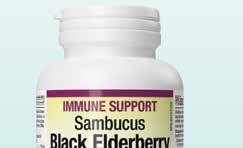


Fast-acting support for immune and respiratory health
• Helps relieve fever associated with the common cold and flu

B VITAMINS can help break down homocysteine, an amino acid linked to Alzheimer’s and dementia risk when levels are high. Low B vitamin levels (e.g., folate and vitamin B12) can increase homocysteine levels, raising the risk of these conditions.
OMEGA-3 and VITAMIN D (vitamin D receptors are found throughout the brain) support neurotransmitter function and communication between brain cells.
PHOSPHATIDYLSERINE supports brain cell membrane structure and function, and may improve memory, cognitive function, and mood.
Diet and lifestyle play a crucial role in reducing the risk of developing neurodegenerative diseases, so it’s important to make positive changes now. Incorporate regular exercise into your routine, opt for a healthy diet rich in fresh, nutritious fruits, vegetables, good fats, and vital supplements, and get plenty of restorative sleep each night. These methods are excellent for prevention and risk reduction.

• Relieves symptoms of colds and flu such as cough, sore throat, and mucus buildup
• Promotes detoxification of the kidneys, skin, and mucous membranes

Some social media users find it just too tempting to try the latest online weight loss trend – and
Too good to be true? Yes, and it’s not at all good for your health. Lisa Valente, a registered dietitian
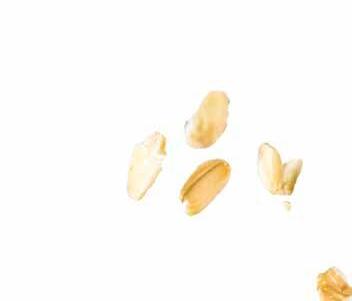





Sure, a restrictive diet centred on just three ingredients in liquid form is likely to cause you to lose weight in the short term, as drinking “Oatzempic” significantly restricts calorie intake while making you feel full. However, regaining that weight is all but guaranteed, and it could put users in a yo-yo dieting cycle that can make it harder to sustain healthier methods of weight loss.
Head to toe? “Pits to bits”? These are two of the (pardon us) cheeky ways that major health and beauty manufacturers are seeking to create a new deodorant category. The companies perceive a need. They say that if less than 1% of our sweat comes from the underarms, why not develop products that also address the other parts of the body that perspire?
Procter & Gamble says its researchers studied 4,000 people and found that 50–60% are concerned about groin odour, 20–30% are concerned about chest or under-breast odour, and 30–50% worry about foot odour. While whole-body products can be used in targeted ways to solve a problem you’ve already identified

Need more to deter you? You may lose lean muscle, experience hair loss, and be irritable and unable to regulate body temperature properly. Endocrinologist Avantika Waring completes the list of health consequences to include constipation, dehydration, dizziness, and menstrual irregularities.
Please beware of the glut of false and misleading information regarding weight loss alternatives on social media. Don’t take your questions to the Internet, but to a true health care practitioner.
– such as on the feet or in the groin –using it head to toe is silly, said several dermatologists contacted by CBS News. As most of our skin doesn’t sweat, wholebody use mostly sells a lot of deodorant. Furthermore, they worry about allergic reactions. People with sensitive skin run the risk of causing itching and contact dermatitis, and women may inadvertently change their vaginal microbiome with indiscriminate use – potentially making them more prone to vaginal infections.
Remember, sweat itself generally doesn’t smell until bacteria are involved. Good hygiene goes a long way in keeping bacterial growth and odour minimal. Change your sweaty clothes and shoes frequently, and avoid tight-fitting fabric. Let those “pits and bits” breathe.
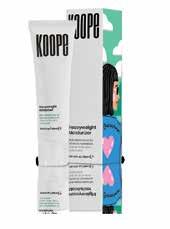
Cleansing and moisturizing are vital steps in your core skincare routine. Koope products are meticulously crafted with potent active ingredients that deeply penetrate the skin layers, ensuring optimal effectiveness. Unlike other brands, we avoid cheap fillers and artificial fragrances, prioritizing only the most efficacious components. Using Koope will nourish your skin, resulting in a smooth, radiant, flawless complexion.
Micronized Fermented Glutamine powder aids muscle tissue repair, digestion, and immune function after intense exercise. Micronized L-glutamine is easily absorbed and helps in restoring glutamine levels. It is tasteless and easily mixed into water.

THE PRODUCTS FEATURED IN THIS SECTION ARE TRUSTED CHOICES AVAILABLE EXCLUSIVELY IN NATURAL HEALTH FOOD STORES.


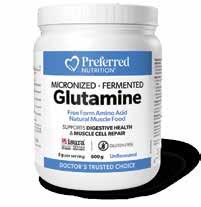
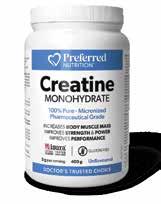
Creatine Monohydrate is rapidly absorbed by muscle cells to replenish ATP stores, which tend to decrease with age. When combined with resistance training, it effectively improves lean muscle mass. Each serving provides 5 g of purified, micronized creatine, ensuring easy absorption, and is suitable for vegans.
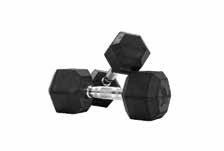
CogniSave all-in-one memory retention kit provides comprehensive nutritional support for cognitive health and brain function. Each convenient packet contains brain-nourishing lipids, B vitamins, phosphatidylcholine, omega-3 EPA/DHA/DPA, plant-based omega-3, -6, and -9 fatty acids, phosphatidylserine, and coenzymated B vitamins. The product is non-GMO.
TestoVitality boosts testosterone to support male libido. Each vegan-friendly capsule provides 275 mg of organic maca and 300 mg of Testofen® fenugreek. These extracts contain active herbal constituents that promote men’s stamina and vitality, and combat fatigue.

“As a 30-something-year-old woman and nutritionist (who’s not getting any younger), collagen has been one unique product that I had my eye on. Why collagen? Unfortunately as we age, collagen density and dermal thickness decrease, and this lack of collagen cues the all-too-familiar signs of skin aging. No wonder we’re obsessed with trying to get more of it.
What some critics say are concerns:
Admittedly, collagen has been a hot topic and for good reason. We all want to look younger, so a product that touts any sort of beauty benefits will no doubt come under a lot of scrutiny. In recent years there has been a growing body of evidence and even larger review studies that collectively point to the same conclusion – collagen supplements

promote healthier looking skin, and decrease visible signs of aging, without any adverse side effects. Another concern that has been shared is that there may be a risk of contaminants and heavy metals in collagen. Although there is merit to this, the truth is that not all collagen supplements are created equally. When choosing a collagen supplement that is bovine-sourced (cattle), it’s best to look for a product that is pasture-raised, grass-fed, and steroidal-hormone- and antibiotic-free. When choosing a marine-based collagen supplement, always look for one that is extracted from wild-caught and sustainably sourced fish, like whitefish.”

NATASHA PAROUTIS, Nutritionist
Why Total Body Collagen™? Revitalize, restore, and protect your skin from within. Support your muscles, joints, and ligaments.
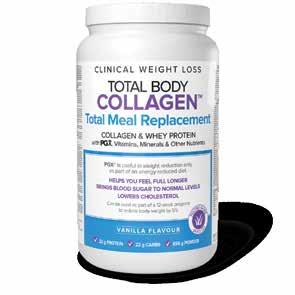


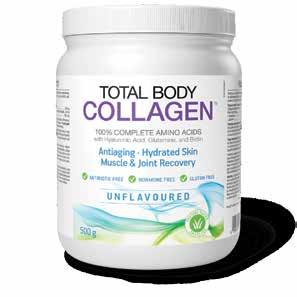
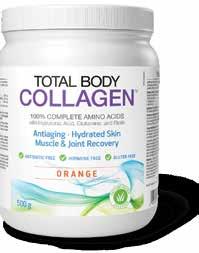

– JULIE REIL, MD and Beauty Expert
“When it comes to feeling good and looking good, I am going to share my secret weapon… it is called Total Body Collagen. I take it with a vitamin C supplement in the morning for my hair, skin, nails, and bones, and it couldn’t be easier. With Total Body Collagen, my hair is thicker and healthier and I lose less hair in the shower and in my brush. Fine lines and wrinkles on my face are getting better as I age and my skin looks and feels more hydrated. My nails are stronger with fewer ridges and grow much faster. As an added bonus, Total Body Collagen supports my bone matrix for healthy teeth and bone density."


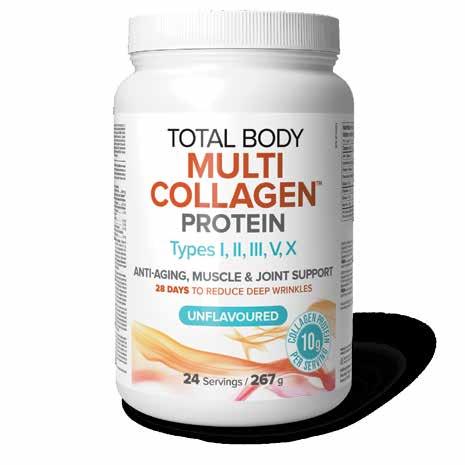
,
BY NADIA BADOWSKI


WV magazine is delighted to introduce you to the incredible Nadia Badowski, the founder of the award-winning personal care brand Koope.

About a decade ago, I started my self-care journey. I had a passion for skin health, had been qualified as an esthetician since my early 20s, and worked as a skin therapist before starting my career in the corporate world. When I wasn’t in the office, I was dabbling in new skincare products, everything from solo ingredient products to highpriced luxury treatments.
However, a few years later, everything changed when I developed large, fiery red welts that covered my face and neck. These welts disrupted my life for almost a year, causing intense pain and inflammation that made it impossible for me to leave the house.
I lived in Europe then, where skincare ingredient regulations are the strictest in the world. I saw doctors and holistic practitioners who diagnosed me with everything from lactose intolerance to autoimmune disorders.
Finally, a dermatologist diagnosed me with dermatitis and chronic urticaria (hives), which were caused by my skincare products. I told her that I had been using the same products for years without any issues. She explained the link between allergens and the immune system. I was going through a divorce at the time, and the stress was weakening my body’s ability to fight off the allergens I had exposed my skin to for years.
And so my research began. I studied common sensitizers (known allergens) used in products labelled “clean” or “luxury,” and began avoiding them. When I removed these ingredients and pared back my routine, the hives immediately began to subside.

complicated. Surely it didn’t have to be like this?
Then, during the early days of the COVID pandemic, I envisioned creating a skincare brand that would be safe for all skin types, simple
I was passionate about brands that gave back, and I couldn’t understand why consumer brands didn’t use their exposure to make a positive impact on people’s lives. This was when Koope was born.



is a staple in any skincare routine. Both hyaluronic acid and sodium hyaluronate penetrate deeply into the skin to hydrate, smooth texture, and soothe the skin.
When formulating Koope products,
If it doesn’t benefit the skin, don’t put If an ingredient is added purely to mask a scent or give a more luxurious feeling, in my opinion, it has no value and may have the potential to irritate or damage the skin. Fragrances and essential oils are high on this list. While they might add a pleasant scent, they very often cause sensitivity and, in some cases like my own, can trigger painful skin conditions. Not every ingredient works best applied topically – Some ingredients work wonders when applied directly to the skin. However, some work better for your skin when taken orally as a supplement or part of your diet. It’s easy to be enamoured by an International Nomenclature of Cosmetic Ingredients (INCI) list full of vitamins and other actives, but they’re not always working hardest when in your skincare product. We don’t fill our products with actives that we know will work better as part of a healthy diet (and unnecessarily hike up the price tag).
Always choose vegan and cruelty-free –In addition to getting nutrient-rich ingredients from plants and seeds, by choosing only vegan ingredients, we’re leaving out potential pesticides and animal by-products that do nothing good for our skin and bodies.
Hyaluronic acid – Holding up to 1,000 times its molecular weight in water, this ingredient
Centella – Centella asiatica is a gentle antioxidant, anticellulite, and antiinflammatory ingredient that moisturizes and heals the skin. Some studies even suggest that it helps slow signs of aging.
Niacinamide – This powerful ingredient helps build keratin proteins, strengthening, smoothing, and brightening the skin. There are also ongoing studies that find niacinamide helps balance oil production.
Oat amino acids – Not only do they replace SLS/SLES, a common foaming agent known to irritate the skin, but they also help retain moisture, and soothe and soften the skin.
Ceramides – Commonly referred to as an “anti-aging powerhouse,” ceramides are naturally occurring fatty acids. They protect against free radicals that destroy elastin and collagen.
Koope is hyper-focused on using quality, allergen-free skin care with the finest clean ingredients while giving back to communities. Above all, Koope prioritizes people over profit because we believe in positively impacting the world. We do this by sourcing cause-driven ingredients where available, such as our baobab oil, part of the Eco-Products® foundation –a non-profit initiative committed to buying fruit directly from rural harvesters and providing under-resourced preschool areas with infrastructure, education equipment, toys, swings, and jungle gyms, right in the community the baobab is harvested. For more, please visit our website at koope.com
Switching your skincare routine can be easy:
Tip 1: Ditch the dirt –If it has nasty ingredients, no need to wean off. You can ditch that product right away!
Tip 2: Let your skin adjust – Give your skin a few days to adjust to new ingredients, just like you would a new vitamin or supplement.
Tip 3: Be consistent –Just like your stomach or any other part of the body, experimenting might cause discomfort. Be consistent with your products to keep your skin happy.


This delicious meal replacement is packed with nutrition. It delivers 25 g of the highest quality high-alpha whey protein, along with 5 g of low-FODMAP Reliefibre* per serving, to keep you satisfied between meals and give your body the nutrient boost it needs. For the ultimate in energy and nutrition, try our delicious chocolate and vanilla powder options.
*This highly soluble dietary fibre and prebiotic is clinically recognized to maintain digestive health and relieve symptoms of IBS.


BY KARLENE KARST, BSc NUTRITION

As a mother of three, business owner, and a true health and wellness advocate, I often get asked how I balance my busy life. In truth, my self-care strategies frequently change as my children grow and progress through different stages of their lives. When adopting healthy practices that lead to a happier and more fulfilling life, be aware that change doesn’t happen overnight. It requires time, effort, discipline, consistency, patience, and knowledge. Choosing what I give myself daily is both empowering and liberating. I am feeling better than ever at 47 – my mind, body, and spirit are thriving, and it feels undeniably incredible!
Below are my six non-negotiable self-care tips for balancing a full life with purpose and passion:
As a mom and entrepreneur, I have developed daily habits to stay focused. My morning routine sets the stage for the day, and I believe habits are key to finding happiness and satisfaction in family, food, career, faith, and friendships. I love mornings because the quiet allows me to find myself without interruption.
What we put in our bodies every day influences how we feel. Food is power, fuel, and health. It’s almost impossible to talk about improving oneself without talking about the food we consume. I eat Mediterranean-style food focusing on whole, real food, lean proteins, and bold flavours.
I’ve struggled with this throughout my life because motherhood requires mental, emotional, and physical energy, making it extremely challenging. My first intuition and priority are the kids; without a doubt, they come first. But I find that if I can carve out time for myself each day, I feel more energized, calmer, and happier and give more to everyone around me.
I have learned to say no to a lot of things. I have to be very strategic about where I put my time and energy and who I give it to. As an introverted extrovert, I crave time at home in my safe space to regroup and feel good. This has meant that often, I go to bed early or sit out many invites
just because I know my time will be better spent resting. Rest is essential when it comes to feeling our best.


The best things in life are free, including time spent outdoors. I feel blessed to live surrounded by the ocean, mountains, and trees. I have spent countless hours walking in the forest, and some days, it made all the difference in attitude during the day. Get outside for a walk, breathe in the fresh air, and you will immediately feel the difference.
The practice of gratitude is powerful. Writing down three things I’m grateful for each morning is a habit I’ve been doing for many years, and I find it incredibly therapeutic. I encourage you to try a 30-day gratitude challenge where you write down what you are grateful for each day. Practising gratitude daily can help us stay present in the moment and focus on increasing our sense of joy, reducing our worries, and boosting our mood to amplify positive energy.
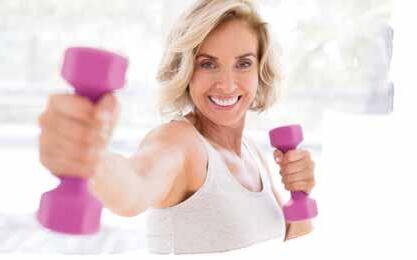
It’s one thing to talk about living a healthy lifestyle, but do your daily habits align and contribute to good health? Let’s put it to the test. Answer the following questions honestly, and check your results below to see how your habits impact your health.
Do you smoke?
A. Yes
B. Sometimes
C. No
How often do you consume alcohol?
A. Every day
B. A few times a week
C. On special occasions or never
What is your activity level?
A. Sedentary: I work a sitting job and don’t exercise
Ditch the alcohol and cigarettes
The jury is in on the harmful effects of smoking and drinking alcohol. Quitting is a huge support for health and longevity.
Eat regularly
Skipping meals is a common issue among my patients. Eating regularly throughout the day keeps your blood sugar steady and your body fuelled.
Focus on wholefoods
Nature knows best. The easiest way to design a healthy, nutrient-rich diet is to focus on wholefoods: fruits, vegetables, meats, beans and legumes, grains, eggs, and dairy.
BY MARITA SCHAUCH, ND
B. Moderate: I work a sitting job but exercise a few times a week
C. Active: I exercise daily or work a physical job
How many hours of sleep do you get per night?
A. Sleep? What’s that? 5 hours or less per night
B. I could use a few more Zs; 5–7 hours per night
C. I get my beauty sleep; 7–9 hours per night
What about your diet?
A. Nutritionally empty; I eat a lot of fast/junk food
B. It could be better; I eat balanced meals a few times a week but give in to many cravings and tend to overindulge
of vitamins and minerals needed for a healthy body.
Prioritize good sleep
I know sleep tends to slide to the bottom of our to-do lists, but it is the key to almost every process within the body. Make sure to get at least eight hours of sleep.
Move it
We were made to move. Even a 30-minute walk daily has a massive impact on your body’s health.
Get your protein
Proteins are the building blocks for muscles and hormone synthesis within our bodies. If you struggle to get enough protein, protein shakes can be affordable essential meal replacements.
Don’t stress it
C. My macros are balanced, and I prioritize nutrient-dense foods from all the food groups
Are you drinking your water?
A. I drink a lot of other beverages, but not a lot of water
B. I have a few glasses throughout the day, but not enough
C. I hit my eight glasses every day
SCORE
Mostly As: Your habits are not supporting your health. It’s time to pick a few simple and sustainable changes to give your body what it needs.
Mostly Bs: You’re doing okay but could be doing and feeling much better with a few tweaks toward healthy choices.
Mostly Cs: You’re killing it! Your body thanks you. Keep up the good work.
9 2 6 10 3 7 4 8
Try multivitamin/mineral supplements to bridge any gaps
Watch your water
Choose water over other beverages. Track your intake with reusable water bottles, and add herbs or fruit infusions to spice it up.
Get outside
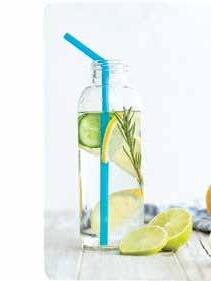
Don’t underestimate the importance of fresh air, natural light, and spending time outdoors in nature. Science shows the positive impact of time spent outdoors on mental and emotional well-being.
Many of us failed in one category or another. Using the answers to your test and these guidelines, prioritize improving one area where you’re failing. Soon, you will have more energy and feel great, and the changes in your health will become the driving force to keep making more improvements. 1 5
A high-quality multivitamin/mineral is a welcome addition to a good diet and ensures you get the full spectrum
Research shows that stress is the number one factor in many health problems. Make time to rest, and use stress-busting techniques like breathwork, natural essential oils, massage, and adaptogen supplements.
CREATINE to BUILD
Creatine is a performance enhancer. It helps with energy production, improves strength in high-intensity physical activity, and increases muscle mass.
GLUTAMINE to REPAIR
Glutamine is a post-workout recovery aid. It assists in muscle tissue repair after prolonged exercise, but also supports the digestive and immune systems. This is critical because exercise can weaken these systems and
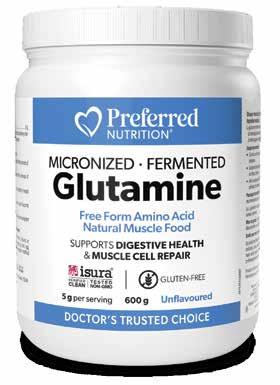
ENERGY RESILIENCE VITALITY





BY STEPHANIE RUBINO, ND
Neurological conditions are at an all-time high. Dementia, migraines, and stroke are examples of nervous system concerns that have increased over the last 30 years, affecting 43% of the world’s population. Aging, genetics, lifestyle, and metabolic risk factors are to blame, but can chemicals in everyday household and personal care products cause harm?
A study published earlier this year revealed that common chemicals found in household cleaning and personal care products damage oligodendrocytes in the brain. Oligodendrocytes are special brain cells that produce myelin, the protective layer of fats surrounding our nerve cells. Researchers found that two groups of chemicals were especially harmful: quaternary ammonium compounds (QACs or quats) and organophosphate flame retardants (OPFRs). Loss of oligodendrocytes can
negatively impact developing brains and lead to neurological conditions. These toxic chemicals are hiding in products we habitually rely on. Quats, for example, kill bacteria and viruses, making them a common ingredient in disinfectant and cleaning products used at home and in public spaces. Fabric softeners, hand sanitizers, and cosmetic products also contain quats. OPFRs are found in electronics, furniture, upholstery, and carpets.
In addition to harming the brain, these chemicals can lead to other adverse effects. Exposure to quats is linked to asthma, skin irritation, and fertility concerns, while OPFRs are persistent organic pollutants that adversely affect the environment and are associated with endocrine and immune disruption. The unfortunate truth is that people of all ages are at risk of constant exposure to these chemicals, and we don’t even know it.
Avoiding contact with these damaging chemicals may not always be possible. Still, we can positively change our household and personal care products for ourselves and our families. Consider these strategies for a healthier home and brain.
Conventional disinfectants, glass and all-purpose cleaners, and laundry detergents are examples of household products with harmful chemicals. Ditch these products and check ingredient lists for safer cleaning options that are free of fragrances, dyes, and quats, such as benzalkonium chlorides and other ingredients ending with “-onium chloride.” Alternatively, make your own products with natural cleaning ingredients like distilled water, castile soap, baking soda, white vinegar, and/or essential oils.
Shampoos, conditioners, hand soaps, and sunscreens are examples of personal care products also known to contain chemical additives. Choose alternatives that are free of quats and other toxic ingredients, such as parabens, phthalates, and fragrances. Alternatively, make your own personal care products with natural ingredients such as coconut and avocado oil, brown sugar, honey, oatmeal, and essential oils.

READY TO MAKE A CHANGE? FOLLOW OUR “FOUR-WEEK HEALTHY HOME CHALLENGE,” designed to help you identify harmful ingredients in your household and personal care products for a healthier home and a healthier you.
DR. STEPHANIE’S FOUR-WEEK HEALTHY HOME CHALLENGE
WEEK 1 – BECOME INFORMED
Learn more about the harmful chemicals in household cleaning and personal care products and safer products to purchase from organizations like the Environmental Working Group (EWG) and the David Suzuki Foundation, as well as apps like Detox Me and Think Dirty® Shop Clean.
WEEK 2 – REVIEW INGREDIENT LISTS
Visit your laundry room, kitchen, and bathrooms, taking the time to read all product labels. Can you recognize the harmful ingredients? Identify these products for replacement.
WEEK 3 – PURCHASE OR CRAFT?
After pinpointing the harmful products, decide whether to purchase a reputable brand or craft your own replacement. Visit trustworthy stores that provide high-quality products for purchase.
WEEK 4 – CHECK AND REVIEW
Are you happy with your changes? Numerous solutions exist to create a healthier home, such as using an air purifier, adding green plants, switching to non-toxic carpets, and choosing low-VOC paints. Continue to make informed choices for your personal health, homes, and the environment.

ALL-PURPOSE CLEANER:
In a squirt bottle, combine equal parts of liquid castile soap, distilled water, and baking soda.
GLASS AND MIRROR
CLEANER: Mix equal parts of distilled water and vinegar in a glass spray bottle. Add a few drops of peppermint or essential oil for scent. Spray on surfaces and wipe with a microfibre cloth. Do not use vinegar on granite and marble surfaces.
FACE CARE: Mix jojoba or avocado oil with vitamin E for an everyday face oil. Combine mashed avocado, honey, and oatmeal for a nourishing face mask and scrub.
NATURAL DEODORANT: Mix coconut oil or shea butter, baking soda, arrowroot powder, and an essential oil in a glass jar and apply as needed.




















































































































































































































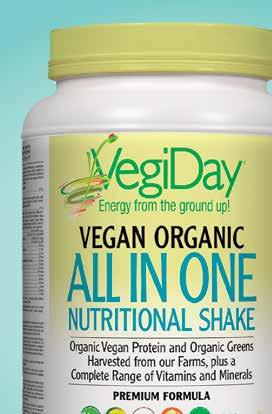
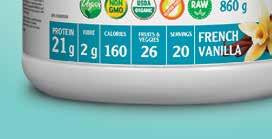


















KARLENE KARST, BSc Nutrition, is the author of numerous wellness books and the cookbook This Kitchen Is for Dancing, which features over 100 satisfying, nutrient-packed recipes full of flavour. She is also the founder of Sea-licious® omega-3 oils and Verily Kitchen sauces. As a self-taught home cook and social media influencer with over 70K followers, Karlene has become a trusted source of inspiration for people seeking healthy and delectable meal ideas.
This delicious and decadent chocolate mousse is always a hit with my guests. It’s a satisfying and healthy snack with a real twist. When I serve this dessert to my guests, they can’t believe it when I reveal that the star ingredient is avocado. The rich texture of the avocado pairs well with the bitter raw cacao, which is healthy and loaded with antioxidants and good fats. This dessert is light, and mixing in a few dark chocolate chips, cacao nibs, and coconut flakes makes for the perfect light finish to any meal. I highly recommend trying and indulging in its health benefits and rich flavour. Bon appétit!
Prep Time: 10 min Cook Time: 0 min Servings: 2
INGREDIENTS
1 ripe avocado
2 Tbsp cacao powder
1 tsp pure vanilla extract
2 Medjool dates, pitted and soaked in hot water for 5 minutes to soften
2 Tbsp maple syrup
2 Tbsp semi-sweet dark chocolate chips
1 Tbsp cacao nibs
Toppings: shredded coconut, and more chocolate chips or cacao nibs
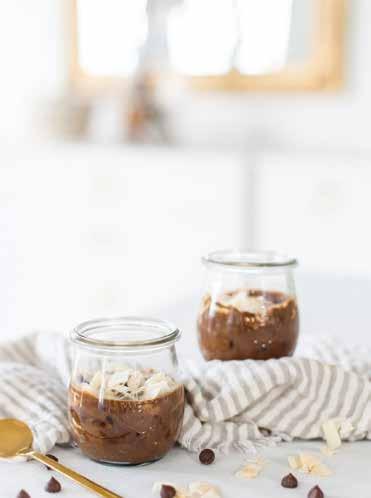
Slice your avocado in half, then remove the pit and gently spoon the meat into the bowl of your food processor with the s-blade already in place. Add cacao powder, vanilla extract, dates, and maple syrup.
Carefully remove the blade. Using a rubber spatula, stir in the chocolate chips and cacao nibs.
Chill in the fridge for a couple of hours before serving. When ready to serve, top with shredded coconuts and/or chocolate chips and cacao nibs, and enjoy! 1 4 5 2 3
Process for 30 seconds. Scrape down the sides of the bowl and process for an additional 60 seconds.
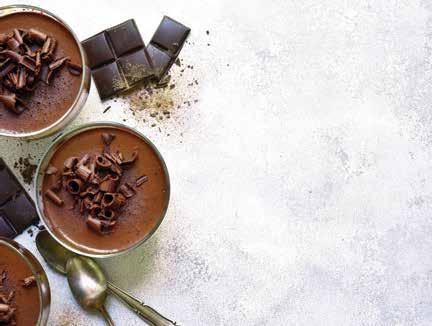
A recent literature review validates what many of us think we know about chocolate – it positively affects our brains. Here’s a breakdown:
• Five out of eight studies included in the review showed either improved mood after eating chocolate or decreased negative mood.
• Three out of eight studies showed “clear evidence” of cognitive enhancement related to the cocoa flavanols and methylxanthines found in chocolate.
• Two studies failed to show behavioural benefits from eating chocolate, but they did identify “significant alterations” in brain activation patterns.
• While it’s unclear whether chocolate’s effects are related to its taste, mouthfeel, or the pharmacological actions of what’s in the chocolate, two studies have shown “acute cognitive effects” with cocoa polyphenols supplementation.
• The authors of the literature review call for further exploration into chocolate’s cognitive benefits and the ways it may result in functional brain changes because of the substances within the chocolate.
Are you eager to contribute to chocolate research? Researchers will have no trouble finding enthusiastic volunteers! However, moderation is the key to all wonderful things in life.
Give yourself the boost you need. These new products spark rejuvenation through powerful antioxidants and inflammation busters, and include a fantastic new sleep aid.
powerful,
Your brain cells demand more energy and nutritional support than any other cells in your body. The ingredients in this kit help to naturally ignite brain mitochondria to produce energy from the food we eat, in convenient all-in-one packets.
• Phosphatidylserine helps nerve cells communicate. It improves memory function and the ability to focus.

• Grapeseed extract and curcumin regulate and reduce inflammation and cognitive decline.
• Probiotics improve the health of your “second brain,” the gut, which can boost neurotransmitter production. These neurotransmitters boost mood and cognitive function.
• Omega-3 helps fight inflammation and maintain brain structure.
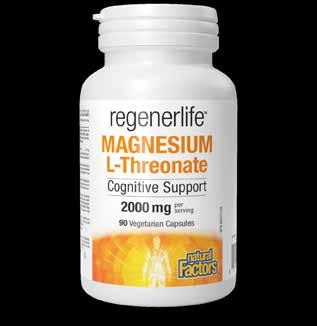
L-Threonate provides the muscle, bone, and metabolism benefits you know and love from your current magnesium supplement, but also helps support cognitive function.



The brilliant Sleep Better tri-layer tablets have 5 mg of quick-release melatonin and 5 mg of delayed, timedrelease melatonin, so you can stay asleep. Plus it has 5-HTP to get you asleep more quickly, along with ingredients (L-theanine, valerian, passionflower, and hops) that help calm you for a restful sleep. No more waking up in the middle of the night!

Taurine plays a vital role in brain, heart, and nervous system function. A new study has found that taurine naturally decreases with age and that supplementing with taurine slowed key markers of aging, such as increased DNA damage, impaired mitochondrial function, and telomerase deficiency.


If you’re working on maintaining your blood sugar or cholesterol levels, you need to know about an enzyme called AMPK – your body’s metabolic master switch. When this switch is activated, you supercharge your body’s ability to metabolize blood sugar and cholesterol. How can you “turn on” this switch? One way is with berberine. Our berberine provides a clinically studied amount of 500 mg per softgel.


BY JENNIFER BRIX, ND

I can’t count how often patients have told me, “Don’t get old.” When I first started practising in my late 20s, aging was so far from my mind that hearing that every week didn’t faze me. Now that I have experienced some agerelated changes, I can respect where they were coming from. Full disclosure: I am now in my mid-forties but don’t consider myself midlife. You can only be midlife if you set an expiration date on yourself. I plan to get old, and I am excited about it. In my clinical practice, I strive to help my patients understand how aging can be a challenging journey
Checking for nutrient deficiencies is important. I encourage patients to get tested for vitamin D. One-third of Canadians and 42% of Americans have insufficient vitamin D levels, so knowing where you sit in the range can help you determine your daily required intake. One recent study found that supplementing with 1000 IU of vitamin D3 encapsulated in a unique delivery system – LipoMicel – raised levels close to seven times higher than taking 1000 IU of a standard vitamin D3.
When I first noticed a bout of brain fog that didn’t go away, I was concerned. This small scare encouraged me to dive deeper into the science of cognitive health, where I found magnesium L-threonate. Magtein® is an MIT-developed form of magnesium L-threonate that is highly effective in crossing the blood-brain barrier. Once there, it supports synaptic (brain cell connection) density. In one study, supplementation with Magtein magnesium L-threonate for 12 weeks led to a 20% improvement in executive function and a 13% improvement in working memory, equating to a remarkable nine-year reduction in brain age. So, it was a no-brainer for me!


A.k.a. anti-oxidize • cellular energy generation. Antioxidants scavenge free radicals directly, and one that you likely already have in your cabinet is vitamin C. Others include vitamin E, CoQ10, and N-acetyl-L-cysteine (NAC). NAC is a precursor to our master antioxidant, glutathione. It plays key roles in detoxifying compounds, including heavy metals and persistent organic pollutants (POPs), and it directly scavenges free radicals. Low levels of glutathione have been associated with chronic exposure to chemical toxins and alcohol, macular degeneration, and neurodegenerative disorders.

After combating several significant stresses in my life, I knew I had to find balance. Two things that work well for me are slowing down and practising gratitude. Engaging in twenty minutes of daily mindfulness exercises promotes self-compassion and is linked to improved mental health, well-being, and quality of life. Practising gratitude helps me reflect on the positive things in my life while changing the perspective of the not-so-positive and finding silver linings. When I need more support, I reach for the adaptogenic herbal extract, KSM-66® Ashwagandha, from the herb’s root KSM-66 can support a reduction in blood cortisol levels and perimenopause symptoms, including both psychological (mood, irritability, anxiety, and exhaustion) and physical aspects (hot flashes, night sweats), as well as improve overall quality of life.
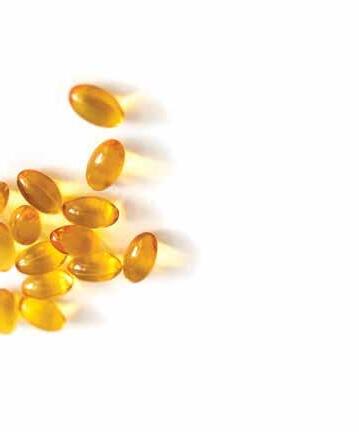

Another nutrient that I have relied on to help balance cortisol levels is phosphatidylserine (PS). And, this fat-based compound also plays a key role in neuron cell structure and function, improving memory, mood, and stress-coping mechanisms because of its ability to act exclusively on brain cell membranes. When it comes to supplements, especially fat-based ones, look for those derived from non-GMO sources and with proof of contaminant testing. These are both signs of high quality and purity –exactly what your brain deserves.
It sounds apocalyptic, but as we age, zombie cells are on the rise. Also known as senescent cells, these cells no longer divide but promote inflammation and play a role in developing agerelated diseases. Nutrients, including curcumin, found in turmeric; quercetin, found in onions and apples; and resveratrol, found in red grapes and red wine, are senolytic, meaning they help clear these cells, reducing agerelated cellular damage.

Nicotinamide mononucleotide (NMN) is a biologically active form of vitamin B3 that the body relies on to make the anti-aging metabolite nicotinamide adenine dinucleotide (NAD+). NAD+ is found in every cell in the body and is essential for hundreds of metabolic processes. By middle age, the body’s NAD+ levels fall to half their youthful levels. Declining NAD+ is a known factor in many metabolic and age-related health problems, contributing to underlying conditions such as muscle and hearing loss, fatigue, and cognitive decline. As a direct precursor to NAD+, supplementing with NMN helps replenish age-related declines, which is why it’s a key feature offensive player in my longevity game.
After more than two decades in medicine and being a mother of a toddler in my forties, I have learned much about aging. But I embrace that my best years can start right now. My longevity playbook’s defensive and offensive moves are ultimately individualized medicine, so what works for me may not be anyone else’s healthy aging solution. I encourage you to find your blueprint to healthy longevity as you take note of the aches and strengths in your body and soul.
BY STEPHANIE RUBINO, ND

COLLAGEN AND PROBIOTICS ARE ESSENTIAL SUPPLEMENTS FOR WOMEN’S HEALTH, WITH BENEFITS RANGING FROM REJUVENATING SKIN TO WARDING OFF URINARY TRACT INFECTIONS (UTIs). Can collagen reduce wrinkles? Do probiotics do more than support digestion? Let’s uncover the facts surrounding these two synergistic must-have women’s supplements for your nutrient nook.
Collagen is often described as the glue that holds our body together, and rightfully so. As an abundant structural protein, collagen forms the extracellular matrix, which supports and strengthens our skin, nails, bones, and other connective tissues. Our bodies make collagen throughout life, but less active fibroblasts (collagenproducing cells) mean less collagen production with age.
During our early 20s, collagen production declines by approximately 1.0–1.5% annually. With time, fine lines develop, along with weak nails, joint stiffness, and thinning bones. Besides aging, also smoking, sun exposure, poor nutrition, stress, and estrogen
loss during menopause accelerate collagen loss. But there’s good news! Research shows supplementation with hydrolyzed collagen peptides stimulates fibroblasts to promote collagen production for connective tissue regeneration.
Within the first five years of menopause, WOMEN LOSE 30% OF THE TOTAL COLLAGEN in their skin, followed by an AVERAGE DECLINE OF 2% each year thereafter. This collagen loss weakens skin tissue, leading to wrinkles, thinning, and dryness. Hair thinning and loss along with brittle nails are also common occurrences. Reduced
collagen production can lead to stiff and painful joints, slow muscle recovery, and reduced bone mineral density. Research on supplementing with hydrolyzed collagen peptides has been promising, revealing the following benefits:
• Reduced wrinkles and fine lines
• Improved skin hydration, elasticity, and smoothness
• Increased nail strength and hair thickness
• Improved joint stability and mobility
• Reduced joint pain associated with osteoarthritis
• Increased bone strength and bone mineral density
• Improved muscle recovery and muscle strength
The digestive tract is home to several microorganisms, including good bacteria, that help establish our gut microbiota. There are 100 trillion bacterial cells in the intestines –about 10 times more than human cells. From digestion to immune function, the microbiota influences numerous physiological processes. Disturbances in microbial balance because of diet, stress, infections, and antibiotic use can lead to dysbiosis. Dysbiosis is associated with IBS, IBD, allergies, autoimmune diseases, and an increased risk of urinary tract and vaginal infections in women. Probiotic supplementation is one strategy that can help address these concerns.
Over half of all women will have at least one UTI during their lifetime, and of these, about 25% will experience recurrent UTIs. Most UTIs are caused by the bacterium Escherichia coli and are conventionally treated with antibiotics. However, overuse
of antibiotics can increase the risk of infections, dysbiosis, and antibiotic resistance. Consequently, alternative treatments for UTIs are necessary. Research has shown that probiotics can restore microbial balance in the urogenital tract; and specific probiotic strains, particularly lactobacilli, can inhibit the growth of E. coli in the urinary tract. Likewise, cranberry and D-mannose supplements reduce the risk of recurrent UTIs and can complement the use of probiotics for UTI prevention.
The vaginal microbiome is largely composed of bacteria, especially lactobacilli, which play a crucial role in maintaining a slightly acidic environment in the vagina and producing compounds that combat harmful bacteria.
Collagen and probiotics complement one another and can be combined for overall health and well-being. Here’s what to consider when selecting these supplements:
COLLAGEN: Choose hydrolyzed collagen peptides clinically shown to benefit skin, hair, nails, bones, and joints. Whether you prefer tablets or powders, opt for a hydrolyzed collagen supplement with third-party testing to ensure purity and safety. Collagen dosing can range from 2.5 to 10 g daily.
Antibiotics, pregnancy, menopause, and sexual activity can disrupt the balance of the vaginal microbiome, triggering concerns of yeast infections and bacterial vaginosis. By restoring and maintaining a healthy vaginal microbiome, inhibiting the growth of harmful bacteria, and modulating the immune system, probiotics provide a safe and effective way to prevent common vaginal concerns in women. Studies have also suggested that probiotics might offer potential advantages for additional areas, including skin conditions, mood, sleep, menstrual discomfort, fertility, and polycystic ovary syndrome (PCOS).

PROBIOTICS: Select supplements that provide clinically studied strains that support women’s health, such as Lactobacillus strains. In the initial stages of probiotic supplements, use a minimum of 1–5 billion colony-forming units (CFUs) and gradually increase to 20–50 CFUs, depending on your health needs. Probiotics are intended to be taken daily and stored properly – some probiotics are shelf-stable, but others require refrigeration. Always read the label to be sure.
Becoming the healthiest version of yourself is crucial for empowering your journey in life. With must-have supplements like collagen and probiotics readily available in natural health stores and online, all women can nourish their bodies positively, fostering well-being and vitality.
If you don’t
“When I was
with
Dr. Whitaker,
he
said to me something I’ll never forget: ‘If you want to prevent a heart attack, live as though you’ve had one.’” – RG
It’s not as hard as you think to prevent disease. The first step to great health is to take action. What can you do? Come to our broadcast and find life-changing answers to your health concerns. Discover solutions
for all aspects of your health: brain, gut, heart, sleep, immunity, and more. Our team of experts has years of experience and knowledge that can really help you live a long, happy life.
Font - Rift channel He alth the Unflattened



Now that you’ve reached your forties and beyond, do you ever feel like you’ve swallowed a whole watermelon after a meal? You’re not alone.
The dreaded “food baby bloat” is a common occurrence, and while some stomach expansion after a meal is normal, bloating twice the size of your stomach indicates issues with your digestive health. Thankfully, there are ways to tame the bloating beast and reclaim your comfort and confidence.

BY MARITA SCHAUCH, ND
First, let’s dispel the myth of a totally flat stomach. Many women will never have a completely flat stomach no matter what diet or exercise plan they follow simply because of the anatomy of their reproductive organs. The “pouch” at the bottom of your stomach serves the important purpose of protecting your womb and ovaries. Some individuals have an anatomy that supports washboard abs, but no one’s stomach is flat 100% of the time. It’s 100% normal for the belly to expand after eating, simply because of the extra volume inside the body and the normal gasses produced during digestion.
That being said, the “food baby bloat” is a different story. This condition refers to excessive and uncomfortable bloating (gas production) after eating and can indicate gut health and digestion issues.
Processed foods, overeating or eating too quickly, stress, certain medications, menstrual cycle stages, or insufficient fibre or water intake can all be factors in bloating. There are also medical conditions that might lead to bloating, including irritable bowel syndrome (IBS) and irritable bowel disease (IBD), gastroesophageal reflux disease (GERD), celiac disease, and food sensitivities. More severe health issues could cause abdominal bloating, such as ovarian cysts, uterine fibroids, and inflammation of the liver, spleen, kidneys, or lymph nodes.
Keep an eye out for symptoms like abdominal pain, changes in bowel habits like constipation or diarrhea, or unexplained weight loss, which may warrant a visit to your health care practitioner.


Certain foods, such as processed foods, excessive salt, and carbonated beverages, trigger bloating. Instead, opt for wholefoods like fruits, vegetables, meats, nuts, and whole grains. Be mindful of food sensitivities, such as dairy, eggs, soy, legumes, or gluten. Some people tolerate these foods well, and others do not. Keep a food diary, notice what foods trigger bloating, and try to avoid them. Probiotic-rich foods like yogurt, kefir, miso, and sauerkraut are great additions to your diet to promote a healthy gut microbiome.
Probiotics are live bacteria and yeasts that offer numerous gut health benefits, including improved digestion and reduced bloating. The probiotic foods listed above are great dietary additions, but many people also benefit from a good probiotic supplement to help their microbiome flourish. Travel Biotic™ is my favourite blend, and it is convenient for busy lifestyles as it doesn’t require refrigeration like other probiotic supplements. You can take it with you to work, school, or travel.


When bloating strikes, it can be hard to know how to alleviate the discomfort. Ginger, papaya, and cinnamon are great allies in reducing bloating. Teas like peppermint and chamomile can help soothe the digestive tract and ease bloating. On the go, I love Natural Factors’ ginger chews and papaya enzyme supplements. They are delicious and effective at reducing bloating while aiding good digestion.
| Remember to chew with your mouth closed and skip the gum. Openmouthed chewing leads to swallowing more air and creates more digestive gas.
| Go for a “fart walk.” Incorporating more physical activity into your routine, particularly after a meal, helps aid digestion.
| Don’t overeat. Lighten your body’s digestive load by opting for smaller, more frequent meals and snacks throughout the day.
Don’t let food baby bloat ruin your life. Take control of your digestive health today. By making a few simple dietary adjustments, you can savour your meals without the burden of feeling miserable afterwards.



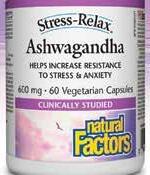

Stress-Relax Ashwagandha features clinically studied organic KSM-66 Ashwagandha® extract to help increase resistance to stress and anxiety in people with a history of chronic stress, thereby improving their quality of life. Ashwagandha is a wellrecognized Ayurvedic herb that is traditionally used as a sleep aid and nerve tonic, and it also provides athletic support.

From a simple seed, planted in the ground with a little water, nutrients from the soil, and a whole lot of energy from the sun, comes the wholesome nutrition that sustains our lives.


Factors Farms® are certified 100% organic. Our crops are fertilized with compost and nitrogenrich sea plants, and are meticulously cared for by hand.
This is the vision that created the greatest multivitamins ever.

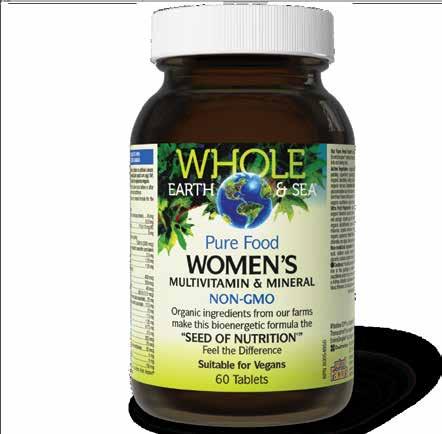



Yes, you can really see and feel
WHOLE EARTH & SEA AVAILABLE ONLY IN NATURAL FOOD STORES



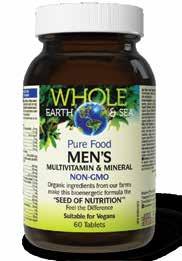




Dr. Karen Jensen was in clinical practice for 25 years and although she is retired, she continues to write books and educate on the naturopathic approach to wellness. She is the author or co-author of seven books; her most recent is Women’s Health Matters: The Influence of Gender on Disease.

What inspired your new book?
Recently, Women’s Voice had the opportunity to talk with Karen Jensen, ND, to find out more about her new book Mental Health Crisis in Children and Teens.
My goal is to bring awareness to parents, teachers, caregivers, and professionals about the alarming increase in mental health disorders in kids and teens and to provide information about the less recognized causes as well as nutritional and lifestyle support. Many doctors are hesitant to prescribe medication to children or teens, but the lack


of availability of other therapies, such as counselling or cognitive behavioural therapy, leaves doctors with few other options. What are some of the less recognized contributing factors to mental health disorders in these age groups?
Highly processed foods lacking in nutrients interfere with brain development and can impair the ability to think, learn, and
remember. U.S. kids consume 67% of their calories from ultra-processed junk food, and Canadian kids consume one-third of their total calories from junk food.
As well, children and teens absorb more electromagnetic radiation, making them much more vulnerable to the damaging effects. Their psychological well-being starts to deteriorate after an average of one hour of screen viewing
daily. The effects are most pronounced in teens aged 14–17 years – more hours equal more risk, including less curiosity, less self-control, more distractibility, and difficulty making friends.
Social media adds to selfesteem issues. If teens internalize what media portrays as the “social or image norms,” they use these messages as a basis for self-evaluation. This can increase the risk of depression and anxiety.

Prescription medication is the most common recommendation for many of these disorders. What are your thoughts or concerns?
The number of young people aged 12–25 years receiving antidepressants has been rapidly increasing since March 2020, and the dispensing rate rose by nearly 64%. Based on these rates, and with the evergrowing demands on doctors, my concern is there will not be sufficient monitoring.
Worse still, the Cochrane review, considered the gold standard in medicine, found that, on average, antidepressants led to only small improvements in depression in children aged 6–18 years.
Are there any other alarming trends that concern you regarding the increase in mental health disorders?
Yes! Teens are also turning to drugs and alcohol to ease stress, anxiety, and depression and to help them sleep. The study found that 73% reported using drugs and alcohol to “feel mellow, calm, or relaxed.”
What can parents and caregivers do to support kids and teens?
Poor diets are strongly associated with mood disorders. Healthy foods like fresh vegetables, fruits, and highquality protein nourish the brain and body. If the main fuel source is “low premium,” like refined foods, the body and brain will not function very well for long. But there is good news. Nutritional psychiatry, the practice of using food and supplements for many mental health disorders, is rapidly gaining ground.
Also, it is very important for kids to have “quiet time” or simply relax. Exercise and time spent doing family activities are very important.
“ “
People are beginning to realize that it is cheaper and more advantageous to prevent disease than cure it.
– HENRY LINDLAHR (1913)
What is your takehome message?
There is hope. Raising awareness about the mental health challenges our kids are facing in today’s world is crucial. In addition, understanding the importance of parent-child relationships, prioritizing a nutritious diet and lifestyle, and acknowledging the potential benefits of natural supplements can significantly contribute to the prevention and treatment of various mental health disorders.



MICHAEL T. MURRAY, ND, is one of the world’s leading authorities on natural medicine. JOSEPH E. PIZZORNO, ND, is an expert on science-based naturopathic medicine and founder of Bastyr University. These educators have nearly 100 years of experience studying medical research and helping patients improve their health and eliminate diseases.
We believe that everyone can benefit from taking appropriate dietary supplements to meet their nutritional needs. The idea that diet alone can provide sufficient levels of all essential nutrients is a fallacy. While conceivably possible, the reality is that most people do not come even close to meeting all their nutrient needs without dietary supplementation.
The data overwhelmingly supports this statement in underdeveloped countries and highly developed countries, including the United States and Canada. People in developed countries are overfed with excess calories but are undernourished when it comes to the intake of essential nutrients for health.
In a study conducted by Dr. Joseph E. Pizzorno that measured many nutrients in 4,500 Canadians, he found that 99% were deficient in at least one nutrient, and more than half were deficient in four or more.
Dietary supplements are critical for counteracting the nutrient deficiencies and physiological stress of the modern diet.
1
ARE SEVEN BIG REASONS WHY EVERYONE NEEDS MORE NUTRIENTS: The recommended dietary allowance (RDA) for nutrients is based on preventing deficiency, not providing optimal nutrition.

2 3
Many RDAs have not been updated from research over the last several decades that indicate higher intakes are needed.
Higher intakes of many essential nutrients are associated with reduced disease risk and accelerated aging.
Dietary supplements are critical for counteracting the nutrient deficiencies and physiological stress of
4 5
Adding to the problem is that the vitamin and mineral levels in our food supply have decreased dramatically because of modern farming practices.
Further complicating the situation is the fact that many environmental pollutants increase nutrient needs both through direct competition and by increasing the need for detoxification and antioxidant support. For example:
Heavy metals, like lead, cadmium, and mercury, impair the absorption or use of calcium, copper, iron, magnesium, selenium, and zinc.
Pesticides, herbicides, and other persistent organic pollutants deplete key protective antioxidants in the body, thereby producing extreme biological stress.
Various disease states and drug-nutrient interactions create an increased need or cause direct nutrient deficiencies.
Genetics, biochemical individuality, and family history greatly impact nutrient needs but are still not addressed sufficiently in setting recommended dietary intakes of nutrients.
One of the key goals of dietary supplementation is to ensure that the necessary nutrients are present to allow the body to maintain health and function.
In addition to serving as necessary factors in normal physiology, many nutrients and dietary supplements possess health-promoting or therapeutic effects as well.
While many people still think that dietary supplements refer only to products containing vitamins and minerals, a dietary supplement includes a great many types of products, including conditionally essential and accessory nutrients, amino acids, herbal products and components, dietary fibre and prebiotics, probiotics, and postbiotics, mushroom and yeast products, enzymes, specialty fats and fatty acids (essential fatty acids, fish oils, etc.), protein, greens, phytonutrients, superfoods, and other natural compounds.
These are tremendous healthpromoting gifts from nature. However, dietary supplements are not drugs, they work differently, often by addressing underlying root causes. Giving the body the nutritional tools it needs to heal is a great form of medicine. Nutritional therapy with dietary supplements is designed to support the body’s own natural healing processes. And that is simply good medicine.

AS FAR AS WHERE TO START WITH DIETARY SUPPLEMENTS. THERE ARE FOUR PRIMARY CORNERSTONES:
A high-quality multivitamin and mineral supplement.
Adequate vitamin D3 intake, typically 2000–5000 IU daily.
A high-quality fish oil product to provide a dosage of 1000 mg of EPA+DHA daily.
Extra plant-based antioxidants like flavonoid-rich extracts such as grape seed extract or a “green drink” product that contains powdered greens. These greens can be dehydrated barley grass, wheatgrass, or algae sources such as chlorella or spirulina. Such products are rehydrated by simply mixing them with water or juice.
AN EFFECTIVE DIETARY SUPPLEMENTATION PLAN BEGINS WITH THE FOUNDATIONAL SUPPLEMENTS, BUT CAN UTILIZE SPECIFIC, TARGETED NUTRITIONAL AND HERBAL SUPPORT WHEN NEEDED.
Our purpose in writing Unlock the Power of Supplements for Remarkable Health is to share a
and
That strategy is the rational use of dietary supplements, which is a critical component of
They require the utmost care, and it’s truly wonderful to care for them.
Big Friends® Multivitamins offer all-in-one chewable tablets with meaningful amounts of vitamins and minerals that are so important for our children. Leia loves Big Friends multivitamins. They taste great!


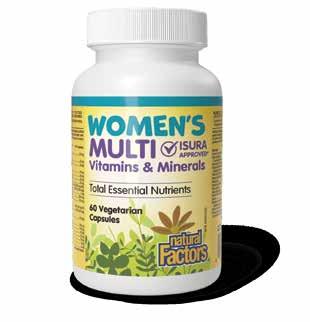


If
Preferred Nutrition is formulated by doctors and nutritional experts who care about your health. Your health matters, and we’re dedicated to helping you reach your full potential. Our vitamins and supplements are held to the highest standards, are recommended by health care practitioners, and bring more choice to Canadian families.



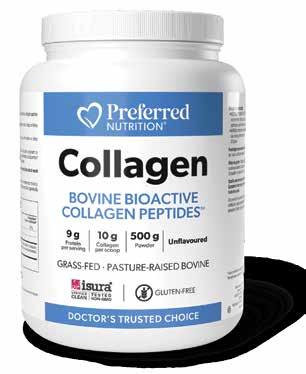
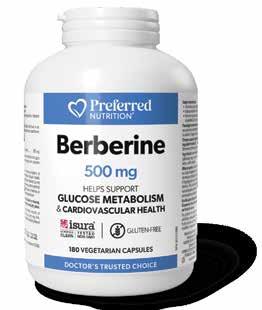


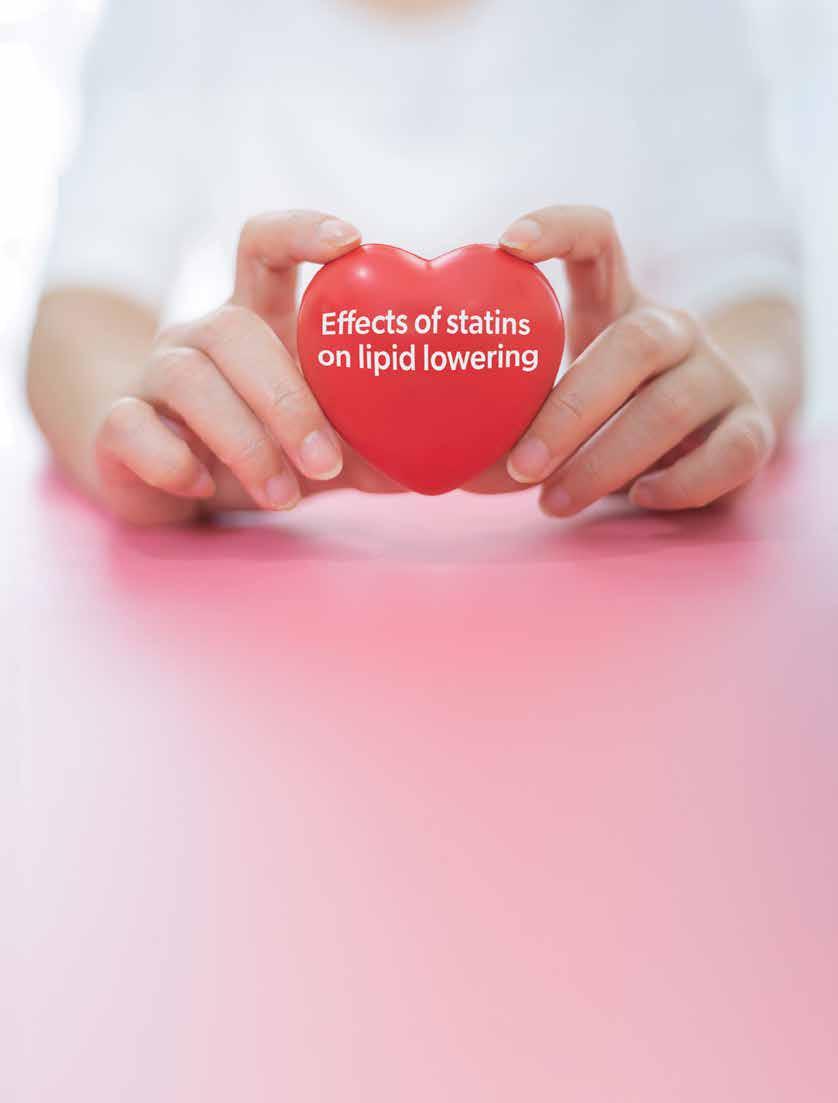
BY KAREN JENSEN, ND
The “Lipid Hypothesis,” which suggests that LDL cholesterol is causally related to coronary heart disease (CHD), started gaining attention from the scientific community around 1951. It remained controversial for many years because of the lack of clear evidence. No individual study was compelling enough. In 1984, the NIH Consensus Conference still concluded that lowering LDL with statins could benefit CHD. Statins are prescription medications used to lower cholesterol levels. They function by reducing the amount of cholesterol produced by the liver and aiding the liver in removing cholesterol already in the blood.
STATISTICAL DECEPTION CREATES THE ILLUSION
Most studies supporting statin use are based on a statistical tool called relative risk reduction (RRR) to amplify the benefits and minimize risks. For example, if a heart attack occurs in 2% of patients in the placebo group and 1% in the drug-treated group, the RRR value would indicate a 50% reduction of the risk: 1 is 50% of 2.
Based on absolute risk reduction (ARR), the benefit to the treated population is one percentage point. This result is unlikely to
generate enthusiasm from the stakeholders and the public. Most trials routinely report findings for the treatment benefits using RRR without the corresponding ARR benefits and risks.
A meta-analysis of 21 randomized trials published in JAMA examined the efficacy of statins in reducing total mortality and cardiovascular outcomes. The reduction based on ARR was 0.8% for all-cause mortality, 1.3% for myocardial infarction, and 0.4% for stroke, with RRR of 9%, 29%, and 14%, respectively. The results based on ARR suggest the benefits of
statins are modest. This information should be communicated to patients in informed clinical decision-making and while deciding clinical guidelines and policies. Currently, one in four people over 45 years in the U.S., and one in ten in Canada, takes statins.
A report published in the Expert Review of Clinical Pharmacology found that statins may cause coronary artery calcification and impair muscle function in the heart
and blood vessels through the depletion of CoQ10 and inhibit the synthesis of vitamin K2, a cofactor that protects arteries from calcification. Statins also inhibit selenium proteins, causing deficiency, a factor in congestive heart failure. The review suggested that the use of statin drugs could exacerbate the global epidemic of heart failure and atherosclerosis.
The results based on ARR suggest the benefits of statins are modest.
Health Canada warnings related to statins include rhabdomyolysis (muscle damage), myopathy (muscle pain), memory loss, interstitial lung disease, increased blood sugar, and diabetes. In the U.S., the Food and Drug Administration (FDA) warns about memory loss, confusion, increased blood sugar, and the risk of diabetes. The NIH warns that some statins cause rhabdomyolysis. Rhabdomyolysis can lead

to permanent kidney damage, coma, and sometimes death, causing some statin drugs to be taken off the market. Statin drugs do reduce cholesterol. They work by blocking the enzyme in your liver responsible for making cholesterol and, yes, your body makes cholesterol because it is essential for survival.
Cholesterol helps produce cell membranes and plays a role in hormone production, including testosterone, progesterone, estrogen, and bile acids for fat digestion. It is essential for the brain, which contains 25% of the body’s total cholesterol, and it is critical for brain cell connections that allow you to think, learn, and form memories. When cholesterol is reduced, these connections do not work well.
Currently, ONE IN TEN people over 45 years in Canada, and ONE IN FOUR in the U.S., takes statins.
Supplement support to protect yourself if you are taking statin drugs
■ COENZYME Q10 (COQ10)
Mitochondria are known as the powerhouse of the cell. They take energy from food and release it as adenosine triphosphate (ATP), which is necessary for muscle contraction, nerve impulses, and protein synthesis. Insufficient CoQ10 inhibits ATP production, and studies suggest that years of statin therapy could result in mitochondrial DNA damage, impairing muscle function in the heart and blood vessels.
■ VITAMIN K1 is the principal source of dietary vitamin K and is needed for proper blood coagulation. Vitamin K2 is essential for avoiding calcium deposits in the arteries, preventing atherosclerosisrelated cardiovascular disease, and building and maintaining strong bones. Vitamin K2 is a crucial cardiovascular health supplement.
■ SELENIUM – Statins can cause selenium deficiency, which has been implicated in developing
myopathies. Heart failure induced by selenium deficiency, known as Keshan’s disease, a highly lethal cardiomyopathy, was first identified in the 1930s.
■ VITAMIN D3 deficiency has been associated with hypertension, atherosclerosis, and heart failure. It plays a crucial role in cholesterol plaque vulnerability, and vitamin D3 deficiency associated with statin drug administration can accelerate atherosclerosis (which affects the brain).
Your health and well-being should be your top priority when taking any medication. Fortunately, numerous dietary supplements can significantly support your body and aid in reducing any side effects that may occur from medication (statin) use. Combining the right supplements with a healthy lifestyle can ensure better support for your body and overall health.





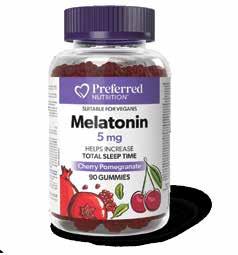





BY KATE RHÉAUME, ND

Sarah, a vibrant woman in her mid-forties, used to juggle work, family, and fitness almost effortlessly. Like the rest of us, when the pandemic hit, her routines were upended. Without the daily excursion to the office or the regular gym visits, Sarah felt more fatigued and lacked the energy she once had. Even though life is seemingly back to normal, it often doesn’t feel like it for Sarah. She recently confided, “I feel like I should be back to my old self by now, but I’m not.”
The “Great Pause” brought upheaval to our lives, leaving many of us feeling out of sync and lacking our usual vitality. Navigating months of deceleration, uncertainty, and limitations on daily activities exacted a toll that takes more than a few weeks to recover from. In addition to meaningful reconnection and enjoyable physical activity, targeted nutrition is essential for regaining energy and maintaining balance to stay powerful.
Foundational nutrition for recouping your oomph isn’t complicated but does require a little planning and mindfulness. Weed out the processed foods that deliver calories but ultimately rob you of energy. Instead, opt for wholefoods like colourful fruits and vegetables, fibre-rich complex carbohydrates, clean protein, and healthy fats (found in nuts, avocados, and fish). This type of fare will supply iron, vitamin B12, and antioxidants
that support oxygentransporting red blood cell production to combat fatigue. Consider taking advantage of a few “secret weapon” nutrients that help complement a nutritious diet to optimize energy.
Borscht lovers rejoice! As a humble root vegetable, beets have emerged as a superfood because of their ability to enhance nitric oxide production in the body.


enhanced energy production and reducing fatigue. Whether you’re a weekend warrior or simply looking to boost your daily resilience, CoQ10 can be a valuable addition to your regimen.

climbing a “to-do” mountain, powdered beetroot concentrate can easily be incorporated into your routine by adding it to smoothies or enjoying it as a stimulant-free, pre-workout
CoQ10 is a naturally occurring nutrient crucial for energy production within cells, particularly in the mitochondria – the powerhouse of our cells. It’s also a powerful antioxidant, protecting our cells from free radicals. As we age, our CoQ10 levels decline, affecting our cellular energy production and overall vitality. The richest dietary source of CoQ10 is organ meats, particularly heart – not a popular

Supplementing with CoQ10 can help replenish our waning supply, supporting
L-glutamine is an amino acid that plays multiple roles in the body, particularly supporting immune function and aiding muscle recovery. During intense physical activity, our bodies use up L-glutamine rapidly, potentially leading to fatigue and slower recovery times. L-glutamine is also an important energy source for intestinal cells, helping to maintain a healthy barrier between the inside of your intestines and the rest of your body.
Food sources of L-glutamine include high-protein foods such as milk, eggs, tofu, and meat. Supplementing with L-glutamine can support faster muscle recovery, reduce post-exercise soreness, and enhance overall endurance. Maintaining the integrity of your intestinal lining can help prevent post-meal fatigue. Pro shopping tip: Look for the words “micronized” and “free form” on the label to ensure your L-glutamine supplement has optimal absorption.
Any dramatic life change can take time to recover from –sometimes longer than we’d fully like. Intelligent nutrition can be a game-changer in regaining your stamina and vitality after a period of stagnation. With the right nourishment and self-care, you can transform your life and be filled with renewed energy and well-being.


We keep out 1,500+ harmful ingredients banned in Europe.



Super-clean cleansers & moisturizers
• Sensitive-skin-friendly: Koope excludes 36 common sensitizers and is fragrance-free
• PETA-approved vegan and cruelty-free
• Cause-driven: For every product sold a donation is made to anti-sex-trafficking initiatives

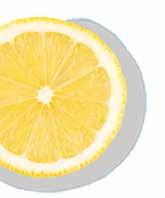
BY JENNIFER BRIX, ND


After becoming a mother to a germ-spreading toddler, I have had to perfect my immunity arsenal and discover effective ways to fortify my immune system to combat the challenges my child faces as they build their immune system resistance. Here are some strategies that are a must to consider for your immunity arsenal, from prevention to symptom relief.
STEP
START WITH YOUR FOUNDATION –TAKE DAILY
Whether bedridden with a nasty cold or in fine fettle, foundational immune support can be implemented year-round.


■ VITAMIN C This essential antioxidant increases immune cell activity and helps heal infected tissue. It also plays a crucial role in maintaining a healthy epithelial barrier to protect against infection. I use Liposomal Vitamin C to provide enhanced absorption for immune support.
VITAMIN D3 Upper respiratory tract infections occur more frequently in people with low vitamin D status. This vitamin activates key immune cells and helps them recognize foreign invaders. Liquid forms of vitamin D3 are easier to swallow, and take up less room in your medicine cabinet.
■ PROBIOTICS When I can’t get in any fermented foods, like kimchi or sauerkraut, I keep probiotics on hand to support my microbiome. Healthy bacteria provide a protective layer in our gut, nostrils, and mouth. I take a broadspectrum probiotic supplement containing at least 10 billion active cells daily.
STEP
ADD IN SYMPTOMMANAGING REMEDIES TAKE WHEN NEEDED
When battling a bug, get ready to fight the good fight to relieve symptoms and feel better with these remedies.
■ OIL OF OREGANO It’s a game changer when I feel the first signs of infection. Several drops a few times daily can help kill viruses and bacteria, including Group A strep, responsible for strep throat. I suggest taking it only when you have signs of infection or know you’ve been exposed.
■ ZINC LOZENGES I like all-in-one lozenges to get my zinc, vitamin C, elderberry, and echinacea. Zinc disrupts viral activity, and elderberry helps relieve congestion, fever, and sore throat. ECHINAMIDE® is a patented and proven form of echinacea that can help stop a cold from developing while accelerating recovery.
■ BEE PROPOLIS SPRAY
Bees use propolis from tree resin to sterilize and seal their hives against invaders. The perfect travel companion, bee propolis and its immune-supporting properties provide a natural form of protection in our world of superbugs.
Now is the time to stock up on vitamins, minerals, gut support, and other household immune essentials for a cozy, healthy winter. Don’t forget warm socks, eucalyptus oil, and lots of tea!


Not all ultra-processed foods are created equal, at least not when judged against data on chronic illness and death. A long-term observational study reported in the BMJ looked at the food habits and health of two different groups of people. The first group ate about three servings a day of what are considered ultraprocessed foods, while the second group averaged seven servings a day. The latter group showed a 4% higher risk of death by any cause, including a 9% increased risk of death associated with neurodegenerative disease. This study assumes that everyone consumes at least some ultraprocessed foods, but the amount and types of these foods we choose to eat make a significant difference. For example, cereals and whole grain bread are considered ultraprocessed, but they contain some useful fibre, vitamins, and minerals. It’s a different story for processed meat (ham, baloney, and salami) and sugarsweetened beverages. The protein in ultra-processed meat is good, but the additives and processing methods harm health. Sugar-sweetened beverages, meanwhile, offer nothing but drinkable calories and, sometimes, caffeine, and should be avoided altogether.
Researchers say it will be determining precisely which additives, emulsifiers, or artificial flavours most contribute to poor health outcomes.

BY KAREN JENSEN, ND

In today’s world, it is almost impossible to avoid media information about the increase in mental health and substance use disorders (SUDs). In the news, various media platforms are flooded with information about climate change, inflationary financial

Marijuana or cannabis use and binge drinking among ages 19–30 and 35–50 have reached all-time highs, according to a study panel funded by the National Institute on Drug Abuse (NIDA). As more people across North America use marijuana for medical and recreational reasons, it is vital to be aware of the potential cardiovascular risks. Two newer studies suggest that regular intake of cannabis in older people may damage heart and brain health. The results of one study in people with
those who used marijuana and also had an underlying medical condition, such as type 2 diabetes, had a significantly increased risk of heart-related incidents compared to patients who didn’t use cannabis.
The general agreement regarding the increased risk of cardiovascular disease (CVD) with cannabis use appears to be linked to how often cannabis is used and the amount of tetrahydrocannabinol (THC) consumed. THC is a cannabinoid
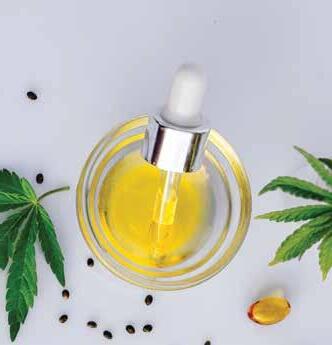


Another critical factor was how cannabis was ingested. Smoking and inhaling cannabis increases concentrations of blood carbon monoxide and tar, similar to the effects of inhaling tobacco, which is linked to CVD. Overall, researchers state that “Based on these early findings… more data are needed to determine the risks, and if using cannabis, it is important to inform your health care provider to monitor heart health.”
Like cannabis, alcohol’s impact on the cardiovascular system is dose-dependent; persistent, heavy drinking increases the risk of CVD, and episodic binge drinking has also been associated with a heightened risk of hypertension, atrial fibrillation, heart attack, sudden death, and, in younger individuals, stroke.
and SUDs and general symptoms of PTSD. In an eight-week, doubleblind, randomized, controlled trial of 116 adolescents, NAC taken at 1200 mg twice daily doubled the odds of abstinence.
Preliminary studies have shown that NAC significantly reduced relapselike drinking and improved impulse control, and research findings continue to support the use of NAC as an adjuvant treatment for the maintenance of abstinence in SUDs.

Reviewing this data could make a person feel helpless about what they can do to reduce the use of these substances. The good news is that several natural supplements are found to help calm the brain, support heart health, and reduce cravings.
GLUTATHIONE FOR SUDS – NAC is the precursor to glutathione, the body’s master antioxidant, which can help fight addiction. Chronic use of drugs can lead to the formation of oxidative stress, which changes the brain’s biochemistry, leading to addictive behaviours. Studies have found that NAC reduces cravings and depression in people with post-traumatic stress disorder (PTSD)
In addition, smokers voluntarily reduced their cigarette use by around 25% after two weeks of supplementing with NAC.
THEANINE has been shown to reduce anxiety, calm the nervous system, reduce blood pressure, and reduce the risk of CVD. Research has found that theanine can protect the body from alcohol damage by reducing free radicals and assisting in the breakdown of acetaldehyde (formed from the breakdown of alcohol), similar to formaldehyde. L-theanine has been found to modulate the chemistry of alcohol and can be taken before or after drinking.
MAGNESIUM has been shown to decrease dependence on opiates, nicotine, cocaine, amphetamine, and alcohol, and reduce the intensity of withdrawal symptoms when stopping these drugs.
In addition to natural supplement support, it is important to seek professional help when struggling with any SUDs. Scientists have proven cognitive behavioural therapy to be effective, and that counselling can also be very supportive. In closing, after considering the potential adverse effects of alcohol and marijuana, it may be time to choose natural support to offset health risks.


BY KATE RHÉAUME, ND
Struggling to focus, experiencing forgetfulness, having difficulty concentrating, and feeling disconnected and mentally slow are terms we use to describe the hard-toput-into-words symptoms of brain fog, also known as brain fade. There has been a spike in posts and online searches for these terms in the past few years.
Like fatigue or pain, brain fog is a symptom that has many underlying causes. At the heart of cloudy thinking lies neuroinflammation. That term may sound alarming, but it’s part of the body’s normal healing reaction. The body produces inflammatory compounds to repair damage in response to injury, infection, or stress. When our brain experiences inflammation, it can disrupt normal cognitive function, leading to symptoms like difficulty concentrating, mental fatigue, and yes, even a dissociated, foggy feeling.
Neuroinflammation has many triggers, all paving the way for brain fog to creep in. Stress, depression, anxiety, insomnia, and viral infections are all culprits that can set off inflammation in the brain. Hormonal changes are a major culprit, with brain fog being a top menopausal complaint. Other issues like low iron levels, excessive screen time, and poor dietary choices can also fuel brain fog.
Living with brain fog can be highly frustrating. However, steps can be taken to clear away the fog and reclaim mental clarity. One powerful approach involves focusing on nutrition to combat inflammation.
OMEGA-3 FATTY ACIDS found abundantly in fatty fish, like salmon, and supplements have been shown to possess anti-inflammatory properties. Adding omega-3-rich foods like salmon and sardines to your diet or taking supplements may help alleviate brain fog.
MAGNESIUM DEFICIENCY impairs the brain’s ability to clear inflammatory compounds, contributing to chronic lowgrade neuroinflammation. Foods rich in magnesium include spinach, almonds, pumpkin seeds, quinoa, and dark chocolate. Magnesium supplements are available for people who may need an intake boost. Magnesium L-threonate, in particular, has been shown to cross the bloodbrain barrier, making it a promising option for combatting neuroinflammation.


PALMITOYLETHANOLAMIDE (PEA), a naturally occurring fatty acid originally found in egg yolks, is known for its natural painrelieving effect. PEA may help reduce neuroinflammation and alleviate symptoms associated with brain fog. PEA supplements may offer relief for individuals struggling with brain fade.

In addition to nourishing our bodies with antiinflammatory foods, exercising regularly, getting adequate sleep, and limiting screen time can all contribute to a clearer and sharper mind.
Be assured THERACURMIN® really works. We have the studies to prove it.
Only Theracurmin
has 19 double-blind clinical studies
“Theracurmin has shown better results in more double-blind, placebo-controlled studies than any other form of curcumin on the market. PERIOD.” – Kate Rhéaume, ND
All Natural
Making Theracurmin even more special is its all-natural composition. The process is entirely natural and no synthetic chemicals are used.
Working memory
Cognitive performance
Heart health and overall circulation
Liver health
Relief for everyday aches and pains



They are like very tiny powerplants that produce energy in every living cell in our bodies. On average, every cell has 1,500 mitochondria. Can you imagine that for their extremely small size, it’s been said that they produce, gram for gram, 10,000–50,000 times more energy than the sun?
To say that mitochondria are important to human health is grossly understating their role in our

survival. We literally would not be alive without them. They convert our food into energy, so that every other function of our body can occur as it needs to. As we age, our ability to create healthy mitochondria to support our energy demands diminishes. And because about 90% of our cellular energy is produced by mitochondria, this decline can cause significant health issues.

